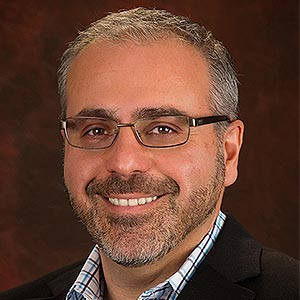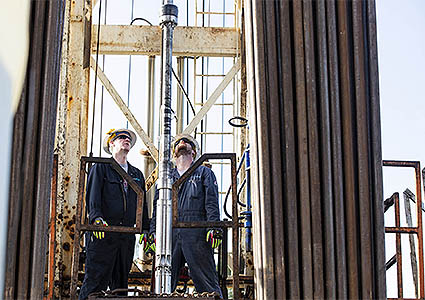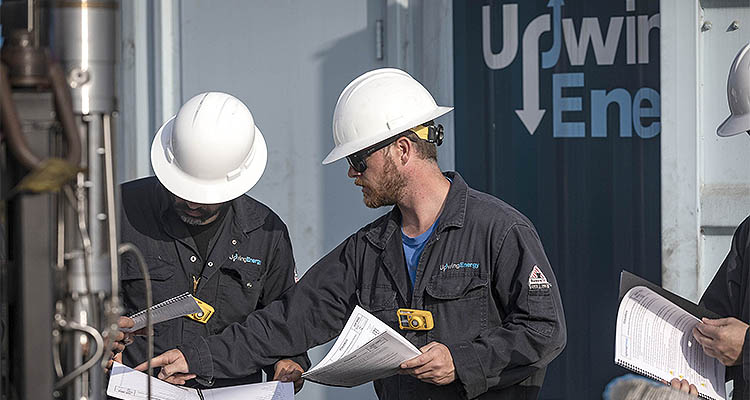Herman Artinian, President & CEO, Upwing Energy, discusses the company’s responsibly sourced natural gas service enabled by subsurface compression
1. Can you provide a brief overview of Upwing Energy and how you came to be in your current role in the organization?
Upwing Energy is a gas tech innovator and service company offering a profitable and sustainable solution for operators to maximize natural gas production and recoverability from existing wells. We have developed the first-of-its-kind subsurface compressor system (SCS), which we offer through our End2End service. The subsurface compressor improves well performance by decreasing bottomhole flowing pressure and causing higher reservoir drawdown. The company’s End2End business model provides hassle-free management of production equipment, operations and data, with no capital or human resources required from well operators.
I joined a high-speed motor technology company called Calnetix Technologies soon after it was founded. Its sole focus was on changing how we harvest and use energy, which it initially accomplished by providing energy efficient systems and subsystems to OEMs. Along that path, we decided to transition to creating spin-off companies that integrated our disruptive technologies into our own systems. The team rolled out multiple companies, some of which I led, all focused on enabling applications that were not being addressed in the energy space. These companies included applications, such as energy storage, subsea pumps and ORC systems for waste heat to electricity conversion. For one of our ORC installations, we went to Louisiana where I was introduced to engine-driven compressors at well sites. In this case, they were used downstream, but this led to the realization that there is significant potential for a downhole compressor. After a year of conducting feasibility studies, Upwing Energy was started with the support of Calnetix, which is how I came to be in my current role in the organization.
2. Upwing has made significant strides since its founding in 2015. Can you elaborate on the company’s vision and mission of balancing energy abundance, affordability, and sustainability?

The company’s vision and mission stem from the fact that energy is required to sustain our modern daily lives and as the world continues to develop and new technologies are introduced, energy demands continue to increase. While I am a strong supporter of renewable energies, today it is unrealistic for them to completely replace the use of all fossil fuels without the potential for astronomically high prices or limited energy availability. Balancing abundancy, affordability and sustainability of energy is incredibly difficult, and natural gas will remain an important piece of the pie that will serve alongside alternative energy sources. Our aim is to efficiently use existing resources so that gas well operators can continue to produce from their wells economically, in turn creating access to increased energy without significant harmful impact to the environment.
3. Your subsurface compression system (SCS) is a pioneering technology in the natural gas industry. What were the key challenges and breakthroughs during the nine years that led to its development?
The early stages focused on understanding the application in a general sense. Many of our initial years were dedicated to researching the industry and understanding the intricacies of natural gas wells. The behavior of each well varies significantly so we had to establish test cells with the capability to simulate real world operating conditions. These testing facilities enabled Upwing to verify and validate SCS performance given unique conditions.
This brought us to a stage where we had the ability to pilot the system. With in-field deployments came many learnings. Through each deployment, we gained valuable insights that led to the ongoing development and optimization of our Enhanced Production Simulator which now not only evaluates production enhancement but accurately predicts multiphase behavior and optimizes the effects of phase change, liquid drop out, placement of the SCS and wellbore geometry.
Another of the earlier challenges we faced was sourcing materials that can withstand the harsh downhole environment, as being deployed two miles downhole and interacting with gas and liquids presents significant potential for corrosion. With extensive trial and error, we were able to determine the material that would work best for the application.
More recently, our focus has been on refining our deployment processes to ensure seamless installations.
4. How do you see SCS transforming the natural gas industry, particularly in terms of production efficiency and emissions reduction?
 There are significant resources that remain untapped because traditional extraction methods were not able to efficiently produce all the existing gas reserves. A study we conducted concluded that in the United States alone there is enough natural gas that can be feasibly extracted with the SCS to power the country for over four years. The situation is the same globally – wells are abandoned with significant gas remaining underground because until today there has been no efficient way to produce more from them. Upwing’s technology has the potential to revitalize these wells and produce natural gas from an unexpected source. This results in a positive environmental impact by reducing the need to explore new wells and eliminating the use of emission-heavy surface compressors. Our hope is that the industry will recognize the advancement we have brought to the market and look for additional areas where improvements can be made so that the industry becomes cleaner and more efficient.
There are significant resources that remain untapped because traditional extraction methods were not able to efficiently produce all the existing gas reserves. A study we conducted concluded that in the United States alone there is enough natural gas that can be feasibly extracted with the SCS to power the country for over four years. The situation is the same globally – wells are abandoned with significant gas remaining underground because until today there has been no efficient way to produce more from them. Upwing’s technology has the potential to revitalize these wells and produce natural gas from an unexpected source. This results in a positive environmental impact by reducing the need to explore new wells and eliminating the use of emission-heavy surface compressors. Our hope is that the industry will recognize the advancement we have brought to the market and look for additional areas where improvements can be made so that the industry becomes cleaner and more efficient.
5. Sustainability is a major concern in energy production. Can you discuss how the SCS technology contributes to lowering emissions intensity and what this means for the industry’s environmental footprint?
From its founding, Upwing has prioritized sustainability in its technology and company practices. There are two main ways the SCS technology aids in lowering emissions intensity in the natural gas industry. The system replaces traditional surface compressors, which are commonly powered by fuel and emit significant amounts of methane into the atmosphere through seals. Upwing’s downhole compressor is electrically driven and is a completely closed system, thus eliminating the escape of methane from the compressor. The SCS also drastically decreases the need to drill and frack new unconventional wells by ensuring existing natural gas resources can continue to produce at high levels. This not only saves capital for gas producers but decreases emissions of over 8000 tons of CO₂e per new well. Upwing offers a method to more responsibly produce this essential energy source. There are also significant improvements being made to detect and address leaks in the mid and downstream. Together we are improving the availability of more sustainable alternatives to traditional technologies.
6. Your recent partnership with Chile’s ENAP is a significant milestone. Can you share more about this collaboration and any upcoming partnerships that highlight the global interest in SCS technology?
As our first commercial deployment in South America, our recently announced partnership with ENAP marks a significant milestone in international expansion. Upwing has worked closely with ENAP to gather data and analyze gas assets, identifying opportunities for additional production and application of the SCS. Upwing will maintain and manage the SCS under its End2End solution model, encompassing analysis and predictions, planning and completions, deployment and startup, and operations and monitoring. Outside of that, we have started to qualify the SCS for offshore deployments in collaboration with Equinor. The qualifications will be conducted at Equinor’s Kårstø test facility and will involve comprehensive testing, including endurance testing, performance testing, and functional testing, to validate its capabilities under representative conditions.
7. How is Upwing preparing to scale its operations and meet the growing demand for subsurface compression systems?
Upwing is already rapidly growing its US team with professionals who are excited about bringing our technology to the wells of new clients. As we continue to expand and demand grows globally, we plan to establish international satellite offices. These offices will allow our field operations team to be close to deployment sites when providing on-site support.
8. In 2022, Upwing raised $25 million in Series C funding. How do you plan to utilize this investment to further advance your technology and expand your market presence?
This investment is dedicated to enhancing our testing facilities and expanding our operations. This funding has already allowed Upwing to establish a new office in Houston, the world’s energy capital. The facility provides a substantial base for our field operations personnel and technical inventory closer to the natural gas wells Upwing is servicing. As we continue to expand internationally, we will utilize this funding to open additional facilities. We have also utilized this funding to upgrade the test facilities at Upwing’s headquarters in Cerritos, CA. These upgraded test stands collectively enable more all-condition testing of the SCS and each unit’s components and subsystems, supporting our goal of continuous improvement.
9. How would you describe your leadership style in driving Upwing’s innovative culture, and what initiatives do you have in place to foster creativity and excellence within your team?
I strive to create a workplace where we trust and respect one another. I make it a point to be transparent with the team, keeping everyone in the loop about company milestones and business activities and encouraging everyone to feel comfortable coming to me to ask for more information if they are ever left with uncertainty. I also find humbleness and humility to be important factors in driving our innovative culture. We have a team of very smart and talented individuals here who are the reason Upwing is where it is today. I will always promote collaboration across all departments because each team member brings a unique perspective and skillset and in working together, we can help one another come up with creative solutions to challenging issues. At the top level of all of this is communication. I do not want anyone to ever feel hesitant to communicate whether it be with me or one another. I also understand that people have different communication preferences, so we have implemented some alternative initiatives to help foster creativity, including departmental and cross-functional offsite brainstorming sessions and a suggestion box for employees to share in a more private manner.
10. How do you see Upwing’s technology fitting into the broader global energy landscape, particularly with the increasing emphasis on renewable energy and sustainability?
I believe natural gas will continue to play a crucial role in the energy mix for decades to come. While renewable sources like wind and solar are very exciting, the reality is that they’re not fully controllable when it comes to sourcing. We can’t dictate when the sun shines nor when the wind blows. The batteries required to hold the energy produced are also not sustainable when it comes to the raw materials needed to develop them. They often cannot hold significant amounts of energy and are not yet environmentally sustainable. This is not to say sources like wind and solar energy and alternative fuels don’t play a role in our energy future, they absolutely do. However, they’re a specific piece of the pie that will serve alongside existing sources like natural gas.
11. What are some of the biggest challenges Upwing faces as it continues to innovate and grow, and what strategies are you employing to navigate these challenges?
The challenges we are facing today are a result of the level of interest we are experiencing. Natural gas is produced globally, and there are many countries with significant wells. It is essential for us to establish a presence in these regions so that we can better support continued production from their existing resources. Upwing also places tremendous emphasis on maintaining company culture. The company has a team of very talented individuals and a positive environment, so as Upwing continues to grow, we look for new members who will share the behaviors, motivations and values our team exhibits today.
12. Looking ahead, what are your predictions for the future of natural gas production, and how does Upwing plan to stay at the forefront of technological advancements in this field?
Global demand for natural gas is expected to grow in the coming years, but with increasingly ambitious sustainability goals, gas producers will begin to look more towards solutions that support both their production and sustainability standards. Upwing has had a significant head start in bringing the industry a solution that makes both economic and environmental sense. Through our End2End service we are not only bringing innovative technology to market but putting the needs of the customer first. Unlike other business models, our team makes understanding each wellsite and clients’ needs a priority, taking on the responsibility of initial analysis all the way through managing operation of the SCS long after it has been installed. As a pioneer in this space, we plan to continue to invest in and leverage our technological advancements and application knowledge to deliver unprecedented value to our clients.
